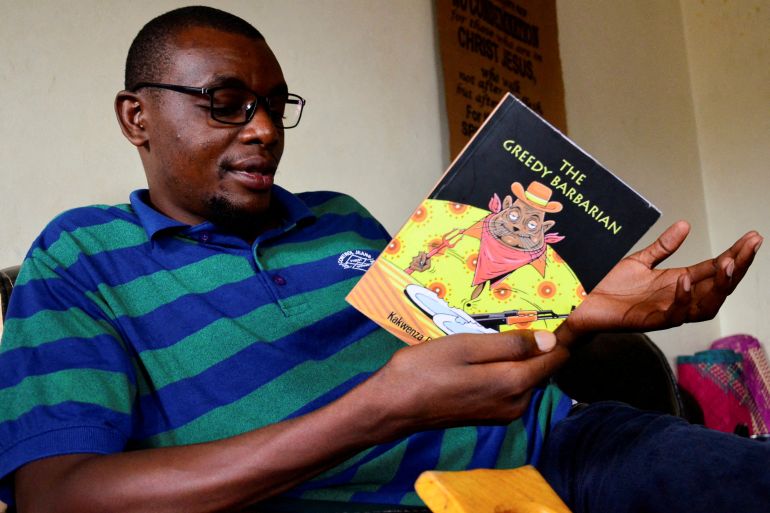Ugandan novelist detained again despite release order: Lawyer
Kakwenza Rukirabashaija was arrested in December for allegedly offending President Museveni and his son on Twitter.

Lawyers for a Ugandan satirical novelist charged with insulting the country’s ruling family said their client was unlawfully detained in defiance of a court order for his release issued just hours earlier.
Kakwenza Rukirabashaija was expected to be released on Tuesday after a court in Kampala had granted him bail and ordered that he not speak to reporters before the conclusion of his trial.
Keep reading
list of 3 itemsUganda plans to reopen schools next year – but who will return?
Presence of Uganda troops in DR Congo temporary: Tshisekedi
Rukirabashaija, who won the PEN Pinter Prize International Writer of Courage award last year, was arrested on December 28 on charges of offending President Yoweri Museveni and his powerful son on Twitter.
His lawyer Eron Kiiza said that instead of being freed, the writer was “kidnapped” from prison by men in plain clothes and taken to an unknown location.
“About four hours after (Tuesday’s) court hearing, armed men in plain clothes came to the prison and took Kakwenza away, we believe to SFC headquarters in Entebbe,” he told AFP news agency, referring to the Special Forces Command unit of Uganda’s national defence force.
“Now we must go back to court.”
Rukirabashaija, who his lawyers say has been tortured since his arrest, seemed frail when he appeared via video link for his bail hearing.
A prison guard told magistrate Douglas Singiza that Rukirabashaija was “complaining of pain” and asked to remain seated for the hearing.
In granting bail, Singiza ordered that prosecutors complete their enquiries into the case by Friday and be ready to state their position at the next hearing on February 1.
He set a cash bail of 500,000 Ugandan shillings ($140) and ordered the 33-year-old novelist to surrender his passport.
The magistrate also warned Rukirabashaija that if he spoke to the press before the case was completed his bail would “automatically collapse” and he would be returned to prison.
After the hearing, Kiiza told journalists he did not think state prosecutors would be ready to present their case.
“I doubt it will go to full trial,” he said.
Reacting to the news, PEN International released a statement on Twitter saying it was “deeply disturbed” by the event and that it feared for the writer’s life. It added that the organisation held the president and his son responsible for such “flagrant abuse of office”.
“Peaceful expression of uncomfortable views is not a crime,” PEN International said on social media.
The organization holds president @KagutaMuseveni, his son @mkainerugaba and the @updf_ responsible for this flagrant abuse of office and #Uganda's laws, and for any harm to @KakwenzaRukira. Peaceful expression of uncomfortable views is not a crime. #FreeKakwenza unconditionally.
— PEN International (@pen_int) January 25, 2022
‘The Greedy Barbarian’
Rukirabashaija has written several books, including his famous The Greedy Barbarian, a satirical novel about a fictional country that tackles themes of corruption and greed.
The novel is widely seen in Uganda to mirror the political life of Museveni, 77, and his government.
Rukirabashaija has been critical of Museveni, who has ruled the country since 1986, and his son, Muhoozi Kainerugaba, a military general widely seen as being prepared to take over the presidency from his father.
Days before his arrest, Rukirabashaija called Kainerugaba in a tweet “pigheaded” and “plump” and denounced the purported plans to have him succeed his father.
Kiiza has said that multiple scars detailed in a prison medical examination of his client were “obvious marks of torture”, and that his detention in December was illegal.
Over the last two years, Rukirabashaija has been arbitrarily arrested twice and detained incommunicado.
In April 2020, he was arrested at his home and detained for seven days. PEN International said that “although the entire interrogation was reportedly about the contents of his novel, he was presented in court on 21 April 2020 and charged with violating COVID-19 health regulations”.
He was arrested again in September 2020 and questioned about his second book, in which he described the torture he was subjected to during his first detention.
The case of the award-winning writer has drawn international attention with the United States, the EU and civil society groups demanding his release and protection from persecution.